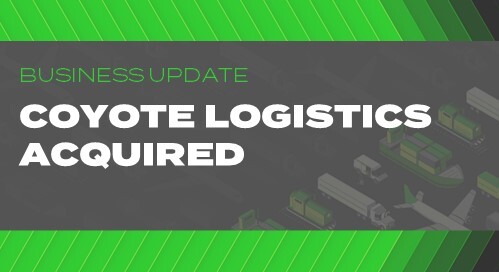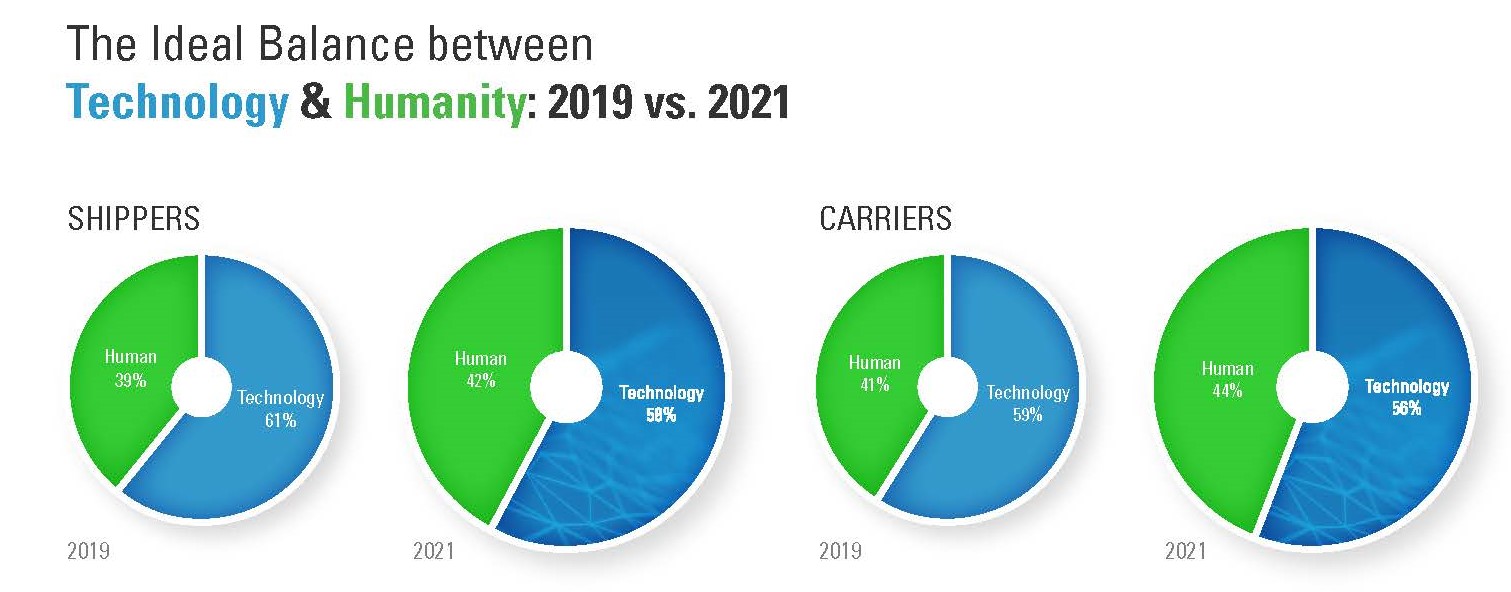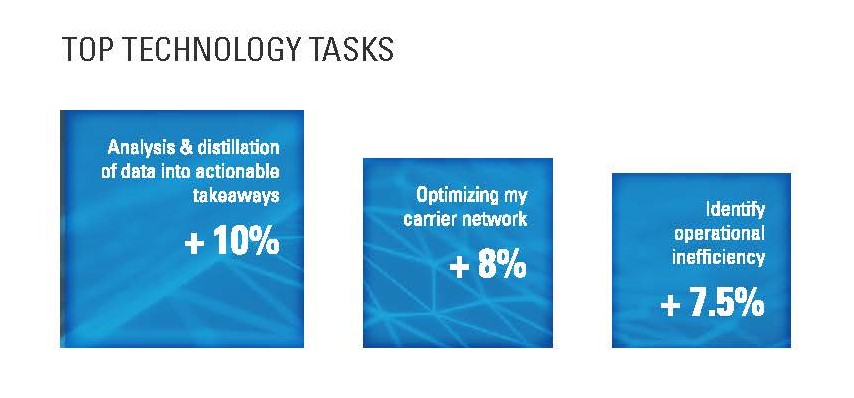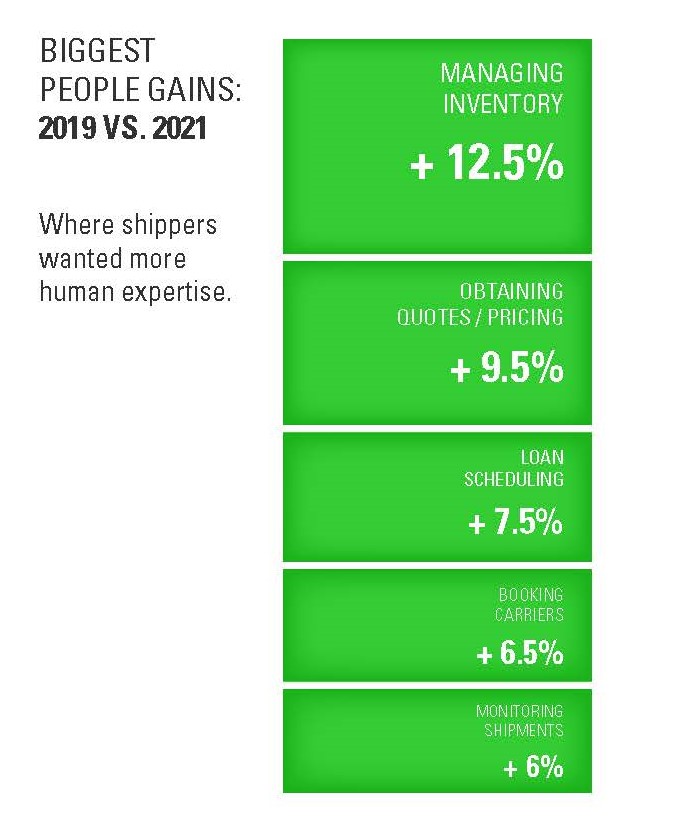Supply Chain Professionals Looking for More Human Support in Response to COVID-19
Global research study reveals how the pandemic impacted the balance of human expertise and technology within the supply chain
Technology and automation have changed the way businesses manage their supply chains. New digital innovations have streamlined manual tasks and enabled industry experts to focus on driving efficiency, planning ahead and managing shifts in supply and demand. But where does the human element fit into this equation?
In 2019, we launched our Tech + Humanity original research study which aimed to identify what global shippers and carriers perceived as the optimal balance of human expertise and digital solutions across critical supply chain tasks. Hundreds of survey responses from global shippers and carriers identified that the optimal balance was 60% technology and 40% human expertise, showcasing that advancements in digital solutions had surpassed the human component in this equation.
However, the takeaway from the study was not that human expertise was becoming obsolete or less valuable, but rather that needs were evolving, and human support and technology working together was the best approach. Computer systems, software and applications can’t solve every business problem. Exception management, issue resolution and curating actionable insights from data are all tasks optimally managed by industry experts working together with technology.
These findings reinforced the need for a strategic balance of digital solutions and human expertise for effective supply chain management.
2021 Update: How COVID-19 Shifted the Balance
Nearly two years after these initial findings were uncovered, today, we are releasing an update to our Tech + Humanity research study with the goal of analyzing how this balance of human expertise and technology across key supply chain tasks has shifted since 2019 and as a result of COVID-19.
These results, curated from survey responses from 850 global supply chain and transportation decision-makers, clearly demonstrate that a strategic balance of technology and human expertise is still the preferred approach. However, notably, we saw a decrease in preference for technology and a greater reliance on people.
This is a significant finding following a year of Zoom calls, remote working environments and the overall emphasis being put on automation and digitalization across the supply chain. We can surmise that the COVID-19 pandemic was a key trigger for this shift back towards human expertise, as it was the dedicated people across the supply chain that stepped up to keep goods moving.
While a 3% decline may not seem like a huge difference, when considering recent trends, even a slight shift away from technology is a resounding call from supply chain leaders that people are still a critical part of logistics management.
“Supply chain professionals are making more critical decisions today that affect the long-term success of their businesses than ever before. This includes determining whether investments in technology or human capital are the right move,” said Jonathan Sisler, Chief Executive Officer.
Tasks moving more towards technology compared to 2019:
From the results of the study, it’s clear that the reliance on technology is evolving within the supply chain. However, its role has simultaneously never been more critical. Here are some of the biggest ways technology use has grown since 2019 among global shippers:
Technology has revolutionized the way members of the supply chain handle data collection and efficiency-based tasks. This will continue to be the case. However, during the COVID-19 pandemic when we saw new levels of volatility and rapid shifts in consumer buying behaviors, only human insight and decision making could solve the challenges businesses were suddenly facing. Members of the supply chain may have realized a lasting benefit.
Tasks leaning more towards human expertise compared to 2019:
According to the study, human-based tasks saw significant gains in several areas compared to the results in 2019. The following are the supply chain tasks that shifted most dramatically towards human support:
Clearly, human ingenuity for skill-based tasks can’t be completely replaced by technology today, and likely never will be — especially during times of extreme volatility. This bolsters the distinct approach we take to servicing our network every day; we have and always will be uniquely positioned to offer the balance of human expertise and advanced digital solutions businesses of all sizes, types and industries require. After all, shippers are most likely to use both human interaction and technology for optimal results across 16 key supply chain tasks as outlined in the study.
The Optimal Balance is Unique and Critical:
“Effective supply chain management doesn’t come from a one-size-fits-all approach. The same is true of the optimal balance of human expertise and technology — every business’ supply chain needs are distinct as we saw in our study. That’s why we focus on offering a unique blend of both digital solutions and consultative services to help every Coyote customer unlock the optimal balance for their business,” said Christina Bottis, Chief Marketing Officer.
The COVID-19 pandemic created the most volatile, challenging environment to ship freight — ever. It increased the pace of digital adoption throughout the logistics industry at a rate never thought possible. And yet, despite the influx of technology, global shippers and carriers are craving more human expertise in their supply chain operations than just two years ago.
Technology has become an expectation — to thrive, businesses need to invest in logistics expertise just as much as automation. As organizations look to strike this balance, the insights covered in our global Tech + Humanity study update can help guide their approach for the road ahead.
“We’re committed to helping our customers find this balance and optimize their supply chain strategies to support their business growth in a rapidly evolving world,” Sisler concluded.
To view and download the full study, please click here.
###
ABOUT COYOTE LOGISTICS, LLC:
Coyote Logistics is a leading global third-party logistics provider that has moved business forward with expertise and integrity for over 15 years. More than 15,000 shippers around the world trust Coyote to move 10,000 loads every day through their comprehensive multi-modal solutions portfolio. Data intelligence and market insights, reliable support and proprietary technology combine with these solutions to enable smarter supply chain decisions and strategies. With headquarters in Chicago and Amsterdam, Coyote is the trusted global logistics provider that empowers business growth in a rapidly changing world. For more information, visit Coyote.com.
Media Contacts:
Bill Theis
Corporate Brand Manager, Coyote Logistics
Kadeja Tyler
Coyote Public Relations, Finn Partners







